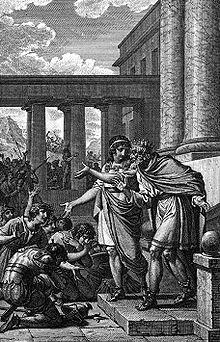Aeacus
In Greek mythology, Aeacus (in ancient Greek Αἴακός Aiakos,Aiacos) was the king of the island Aegina, located in the Saronic Gulf. Aeacus was very famous for the rigor of the sense of mercy and justice with which he ruled his people. His judgments were sought from all over Greece, so much so that after his death he was appointed judge of the shadows in Erebus, along with the Cretans Minos and Radamantis. A later elaboration of the myth tells that Radamantis judged the souls of the Easterners, Aeacus those of the Hellenes, and Minos had the deciding vote.
Childhood
Aeacus was the son of Zeus and Aegina, daughter of the river-god Asopus, so his birth linked the Olympians with the immemorial chthonic water spirits of the country. His mother was taken by Zeus to the deserted island of Oenone, which has since been named after her: Aegina. He was one of Zeus's favorite sons, to the point that he tried to make him immortal, but the Fates (fate) prevented him.
Myrmidons
Realizing Zeus' infidelity, Hera, his wife, sent a terrible plague that decimated the island's population. Aeacus then prayed to his father Zeus for help. The king of the gods turned the ants on the island into men, who were called Myrmidons and who would later fight in the Trojan War alongside their top leader Achilles.
Wall of Troy
His fruitful prayers to Zeus for rain in a time of drought were commemorated in a temple on the island of Aegina. He himself erected a temple dedicated to Zeus and helped Poseidon and Apollo (who had been punished by Zeus) in building the magnificent walls of Troy for King Laomedon.
Aeacus and Endeis
He had an affair with the Nereid Psámate (Ψάμαθη, from ψάμαθος: «sand from the seashore»), from which the ill-fated Focus was born. Later he married Endeis de Megara, from which he had the heroes Telamon and Peleus (father of Achilles). The latter, perhaps incited by his mother, killed his half-brother Focus, for which Aeacus, terribly affected, expelled them from his kingdom. Psámate's anger was such when she found out that her son had been killed that in revenge she became a wolf that killed the cattle on the island of Aegina.
Death
When Aeacus died, he became a judge of the dead in Hades, along with Radamantis and Minos.
More information
None of the other archaic priest-kings who ruled Aegina is remembered by mythographers, as the grandsons of Aeacus and sons of Focus Panopeus and Chrysus left the island and settled in Phocis, a region bordering the Gulf of Corinth, east of Boeotia.
In The Frogs by Aristophanes, Dionysus descends into Hades and introduces himself as Heracles, causing Aeacus to lament his theft of Cerberus and condemns him to be tortured in Acheron by the hounds of Cocytus, Echidna, the Tartessian murena and the Tritasian gorgons.
Aeacus was the ancestor of the Aeacid lineage. Alexander the Great traced his ancestry to him through his mother.
Contenido relacionado
Brigham young university
Alcinous
Religion in egypt
